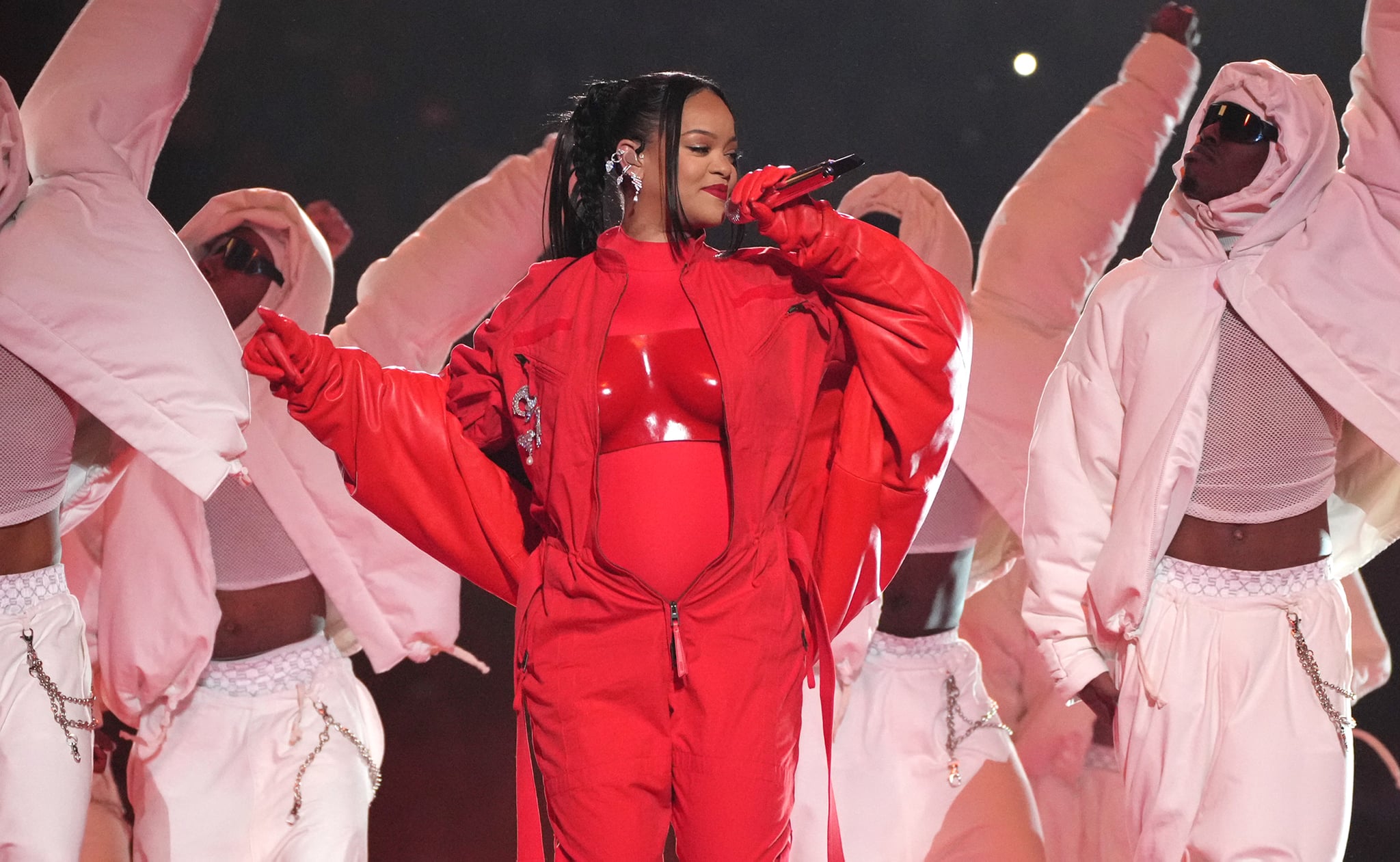Image Source: Getty / Kevin Mazur
With the 2023 Super Bowl halftime show sadly behind us, the general consensus is that Rihanna’s pregnancy announcement — in other words, her appearing on stage with a visible baby bump — was at least an entertaining surprise, at most a triumph.
But before the news of the singer and mogul’s second pregnancy had officially been confirmed, the reactions to the performance were decidedly split. Not about the music — it was an incredible halftime show, filled with Rihanna’s greatest hits. But instead of talking about the performance, people were focused on Rihanna’s body, with many speculating about whether or not she was, in fact, pregnant. And amid those reactions, a slightly smaller crowd was piping up, pointing out it was totally inappropriate to be asking the question at all.
@jessiheni22 It was last week i stg #fyp #rihanna #halftimeshow
Of course, Rihanna did end up being pregnant, as a rep confirmed very soon after she left the stage. And it’s very likely she hoped her performance would generate some speculation. She said in an interview with British Vogue (conducted ahead of game day and before she’d shared her news) that she intended to “put on a show.” At a press conference a few days before the game, she teased that she was “thinking about bringing” a special guest.
But even so, many people continue to feel frustrated with how the conversation around the performance and Rihanna’s body played out, especially because many started publicly commenting on the singer’s belly within seconds of her walking on stage, well before anything had been confirmed.
Why People Are Calling Out “Bump Watch” Speculation
Celebrities’ bodies have long been intensely scrutinized, from being praised when they “snap back” postpregnancy to being the subject of intense pregnancy speculation. Jennifer Aniston faced years of tabloids playing guessing games about potential baby bumps. Recently, Aniston spoke about her struggles while trying to conceive; one can only imagine how it felt to read headlines like “Jen’s finally pregnant!” during that time.
In November 2020, “Rolling Up the Welcome Mat” singer Kelsea Ballerini responded to similar rumors: “I’m sure you mean well, but it’s incredibly insensitive to ask or assume if another woman is pregnant,” she tweeted. “I’m not, by the way. Just carrying around my organs. But if I were, I’d want to share that in my own time when I felt ready. Let’s not judge bloat levels on the internet.”
Whether Rihanna assumed it would be obvious that she was expecting again or if she hoped to keep the crowd guessing throughout the performance, the reality is that most people aren’t in that kind of control when their bodies are being talked about. “Although Rihanna is pregnant, her performance and announcement were a timely reminder to avoid making any assumptions about someone’s body,” says Laura Purdy, MD, family medicine doctor and chief medical officer at Wisp. “Postpartum bodies can look very different depending on the person, and carrying weight postpregnancy is very common, especially within the first year after giving birth.”
The risks of speculating about whether or not someone’s expecting should be clear. For one, the person you’re talking about could be going through fertility treatments, pregnancy loss, or any number of illnesses that can lead to physical changes.
But commentary about how someone looks can also become a form of body shaming, whether intentional or not. “Speculating about whether someone is pregnant without knowing for sure promotes fatphobia and weight stigma because it indirectly supports the idea that if someone looks like that (has weight around their stomach, for example), they must be pregnant. When in reality, people’s bodies change throughout their lifetime whether or not they’re carrying a child,” says Gabrielle Ferrara, LCSW, a therapist who specializes in eating disorders and body image. This kind of speculation “perpetuates stigma and discrimination around body image and different body types,” she adds.
While it can be harmful to ask even a handful of close friends if they think so-and-so is expecting based on their appearance alone, when these conversations take place in public forums like Twitter, they can cause even more damage.
“When people comment or speculate about pregnancy, it sends the message of how important it is for the rest of us to be hypervigilant about the way we appear,” says Sarah Herstich, LCSW, eating-disorder and body-image therapist. “It also sends the message that if weight gain is because of pregnancy, that’s OK. But any other weight gain will be condemned and scrutinized. This reinforces the cultural narrative that bodies ‘should’ appear a certain way. And anything outside of that ideal should be judged and ‘fixed.'”
In the days following the Super Bowl, many are sharing self-deprecating jokes about being defensive over Rihanna’s pregnancy speculation. But ultimately, these experts say it’s better to err on the side of caution. “I think it’s good that people feel icky about it because it means we are making progress in having these difficult conversations and challenging fatphobia and weight stigma,” Ferrara says. “Most people had a reaction of ‘hmmm, speculating about this doesn’t feel quite right.’ Feeling uncomfortable is a sign of growth and progress sometimes!”
Avoiding appearance-based language can help shift social norms and how we view “health” as it stands now as a social currency. The reaction to Rihanna’s performance is a reminder to shut down any conversations about other people’s bodies, especially speculation around pregnancies — even celebrities. It’s a practice in empathy that goes a long way.

